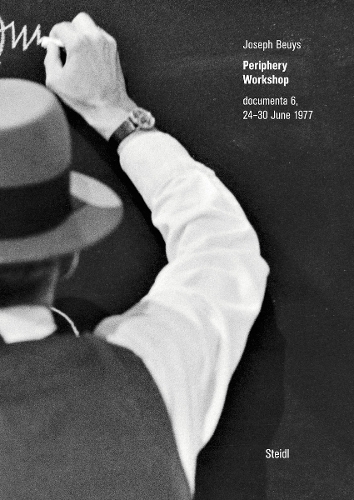
Joseph Beuys: Periphery Workshop: documenta 6, 24-30 June 1977
(Hardback)
Available Formats
Hardback
Published: 6th November 2022
Hardback
Published: 6th November 2022
Hardback
Published: 6th November 2022
Hardback
Published: 23rd November 2022
Publishing Details
Joseph Beuys: Periphery Workshop: documenta 6, 24-30 June 1977
By (Author) Joseph Beuys
Photographs by Klaus Staeck
Photographs by Gerhard Steidl
Steidl Publishers
Steidl Verlag
6th November 2022
Germany
Classifications
General
Non Fiction
History of art
Theory of art
709.04074
Physical Properties
Hardback
112
Width 210mm, Height 297mm
880g
Description
On 27 April 1973, Joseph Beuys founded the Free International University for Creativity and Interdisciplinary Research, a staunchly anti-establishment institution designed to help individuals realize their creative potential (regardless of their social, economic and educational backgrounds); and for that creativity-through art-to foster social progress. As part of the university, Beuys staged an ambitious series of 13 workshops over 100 days at document 6 in 1977, including the Migrant Workshop, the Violence and Behavior Workshop, the Nuclear Energy and Alternatives Workshop, and-the subject of this book-the Periphery Workshop.
At the heart of the Periphery Workshop were, in Beuys' words, the themes of "peripheral regions Europe / enlarging the EEC / France-German axis / common strategies for the regions and the Mediterranean countries." In a collaborative and inclusive spirit, visitors from across the globe were invited to discuss and ask Beuys any question on these topics they might like. Beuys, ever the showman, was more than happy to answer, and not just with words. He filled dozens of blackboards with fascinating drawings, diagrams and thoughts-intricate artworks in themselves, and the basis of this book.
In places like universities, where everyone talks too rationally, it is necessary for a kind of enchanter to appear. - Joseph Beuys
Author Bio
Widely regarded as one of the most influential artists of the twentieth century, Joseph Beuys (1921-86) was a sculptor, draughtsman, action and installation artist, as well as a teacher, politician and activist. After serving as a soldier in World War II, experiences that would strongly shape his practice, he studied sculpture at the Kunstakademie Dsseldorf, where he was made professor in 1961. From the early 1960s Beuys dissolved the difference between his biography and art, and increasingly employed his persona and charisma in what he deemed art's ultimate purpose: to radically democratize society. He called for the adoption of his universalist conception of art as a creative, transformative force within politics, science, philosophy and economics. Now as then, Beuys exerts a palpable influence upon artistic and political discourse.
